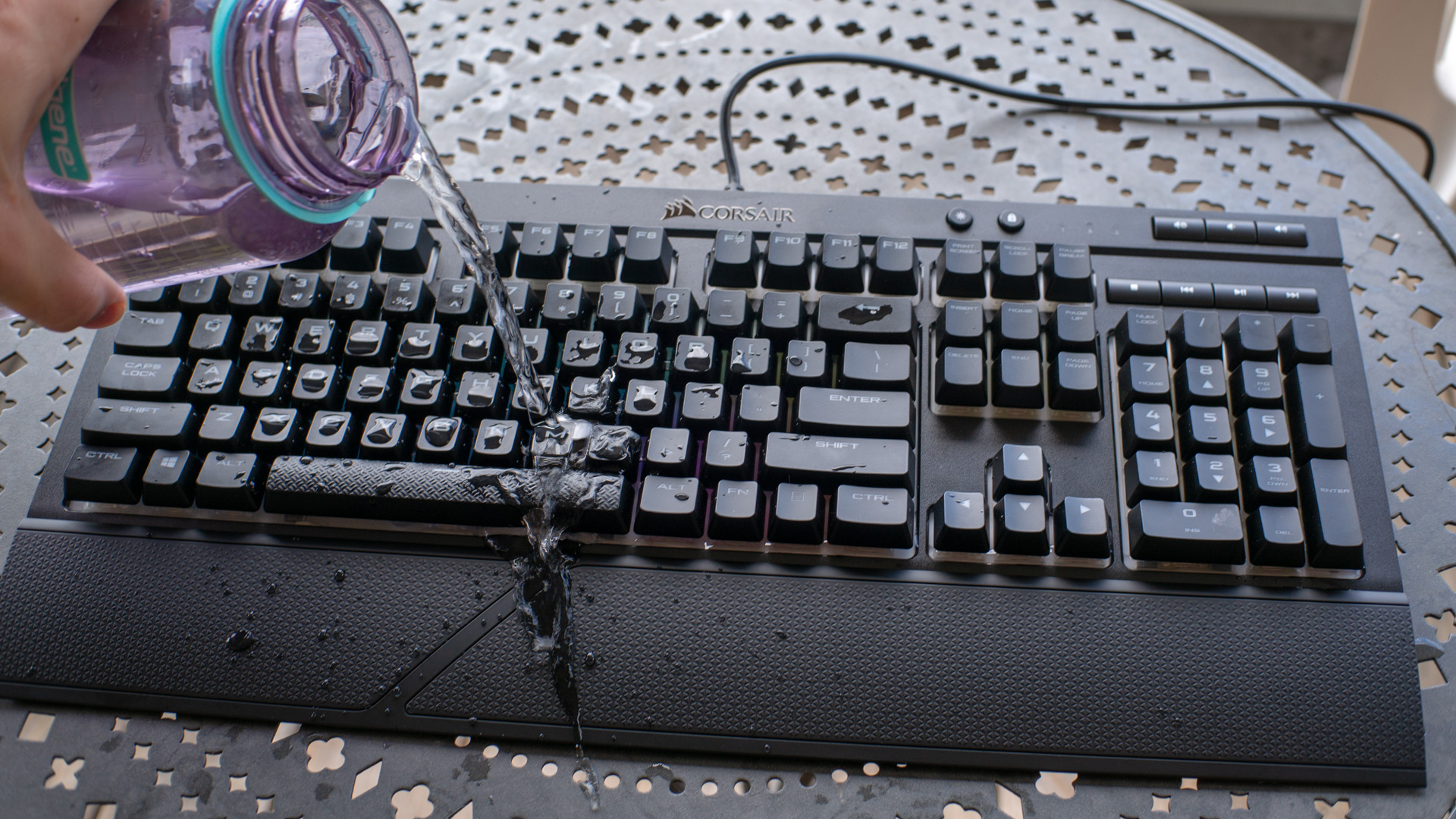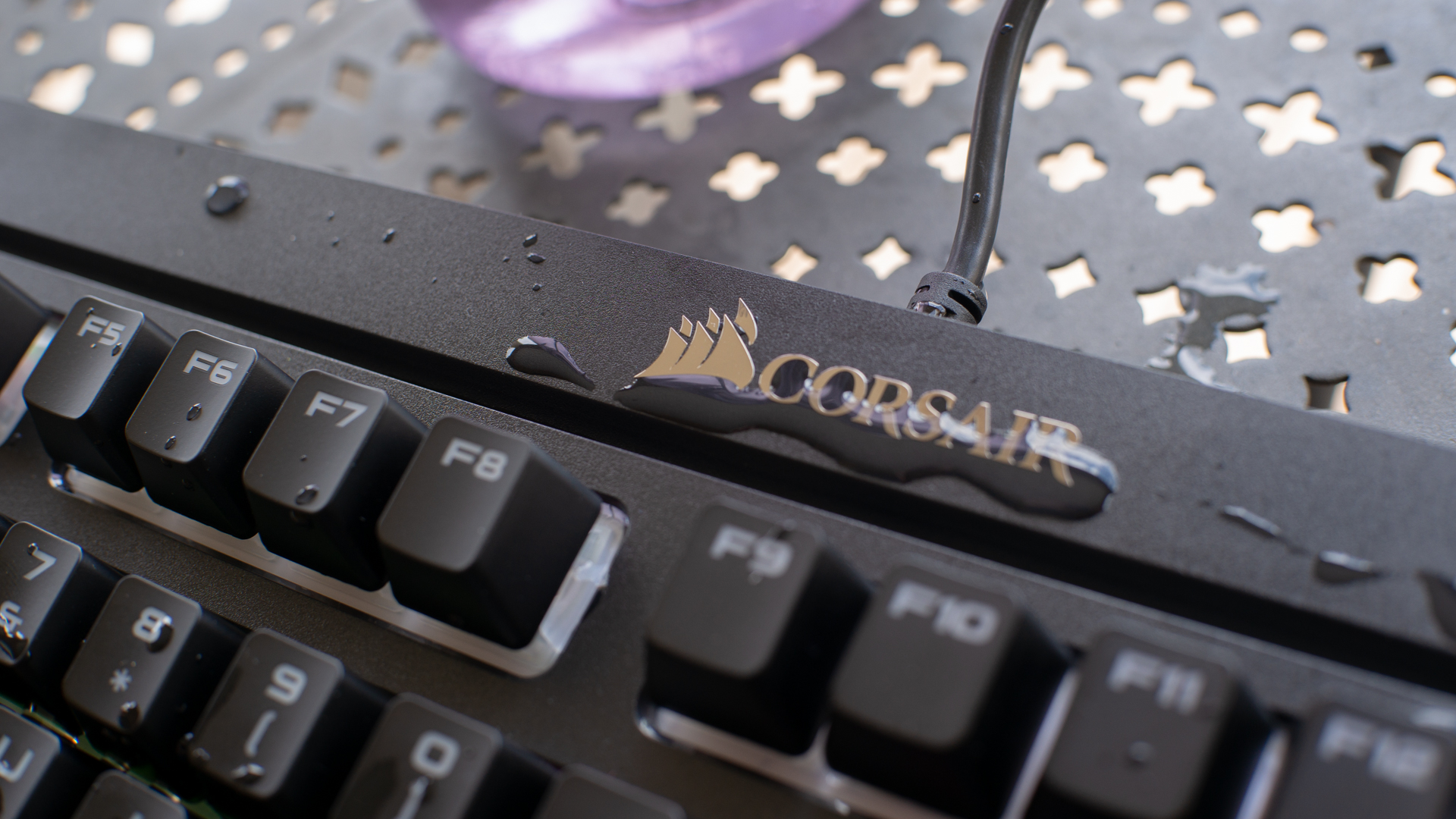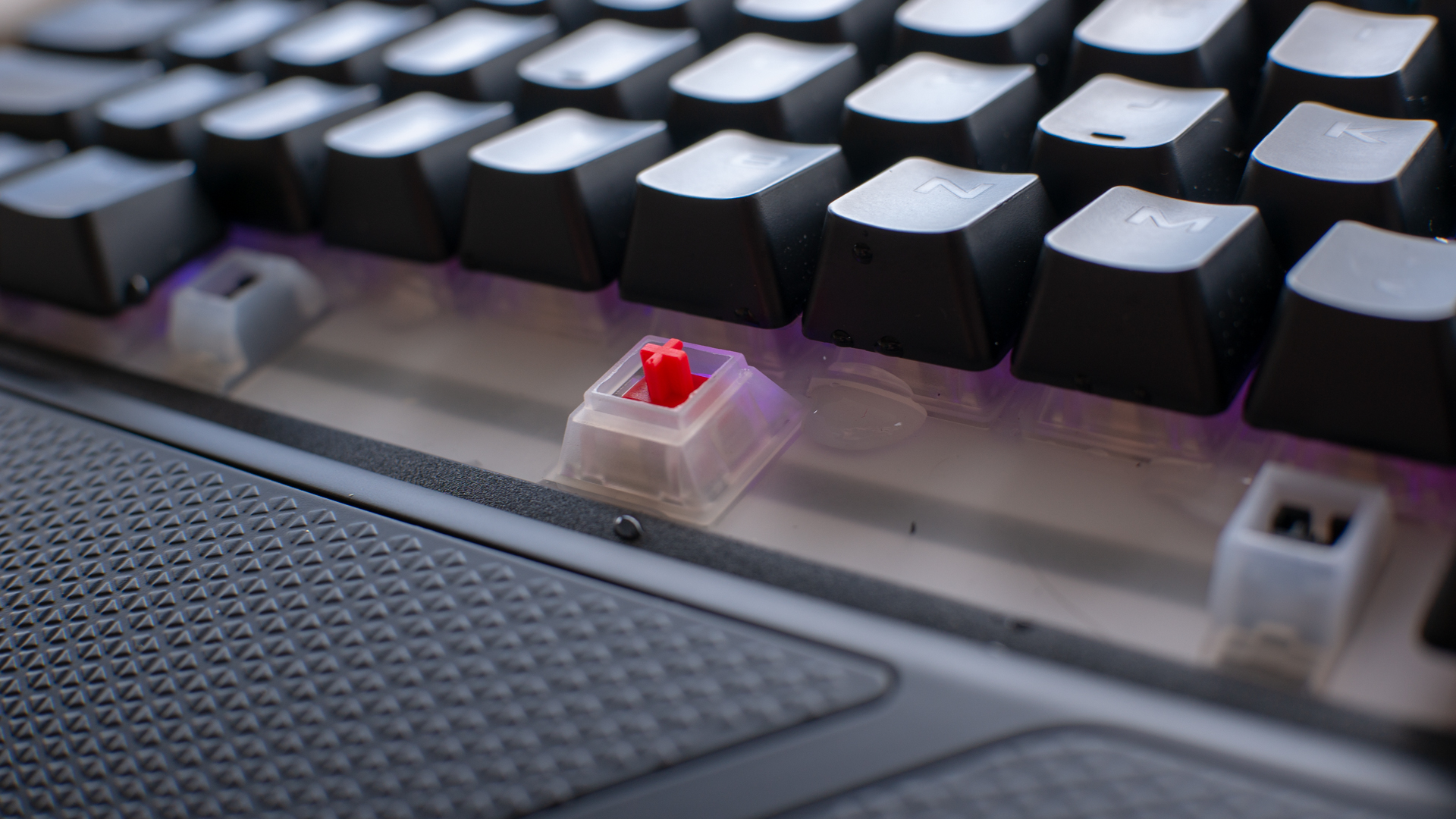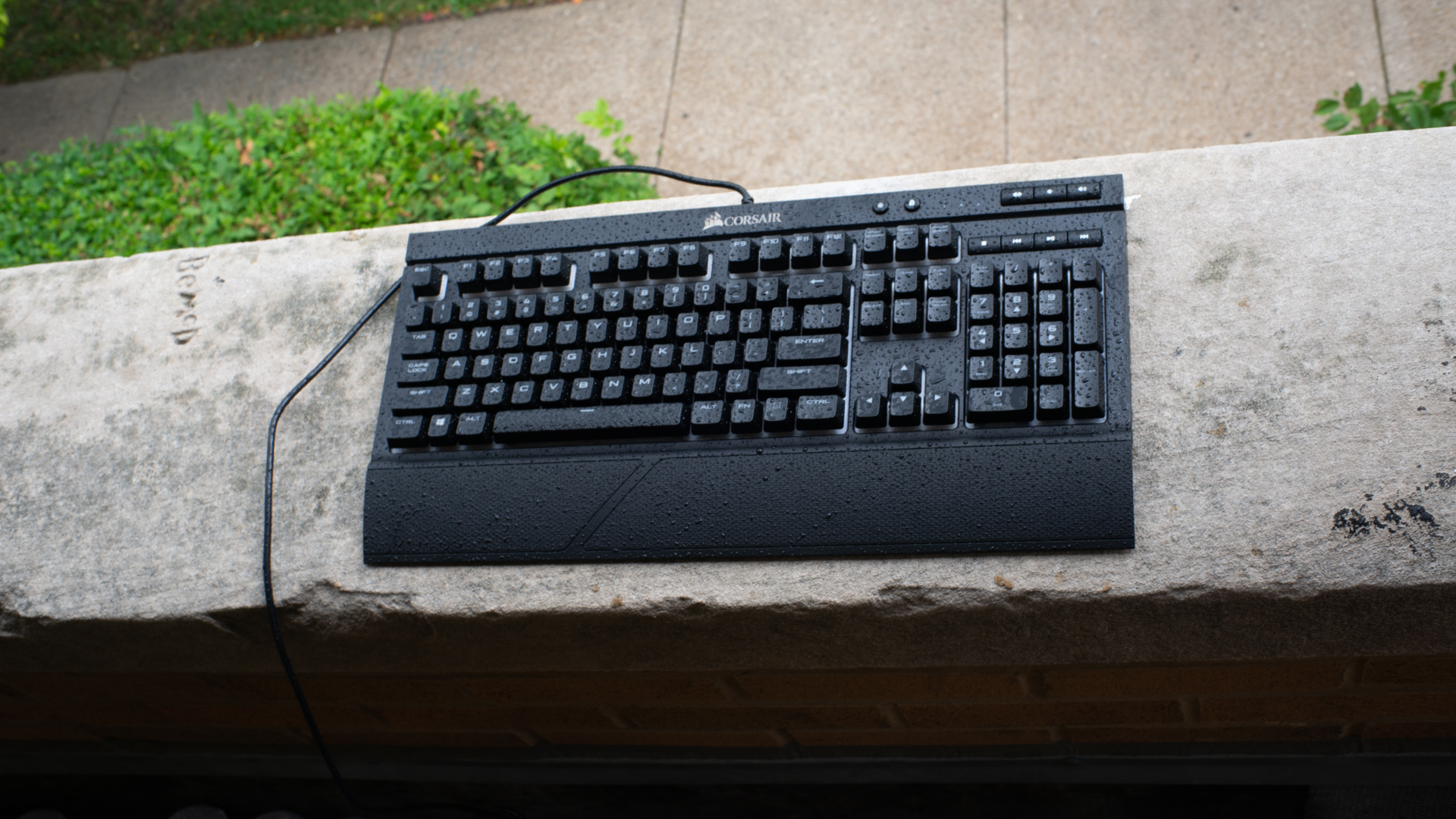TechRadar Verdict
The Corsair K68 RGB takes a good mechanical keyboard and adds protection from spills. The comfort and customization software could be improved, but for the price, it’s already offering plenty.
Pros
- +
Quiet for a mechanical keyboard
- +
Not afraid of spills
- +
Fair price
Cons
- -
Grease-magnet keycaps
- -
Sub-par wrist rest
- -
No drainage system
Why you can trust TechRadar
Sometimes it seems like certain keyboard models exist just to exist, but Corsair’s K68 RGB mechanical gaming keyboard feels like it has a reason for being. The reason? To have a high-performing gaming keyboard that isn’t afraid of a spilled bottle of orange Fanta.
Corsair put together what is essentially your run-of-the-mill RGB mechanical keyboard with Cherry MX Reds (or Blues as an alternate option), and then installed water and dust protection. And, it only costs a modest $119 (£119, AU$199). This prices it below similar keyboards like the $139 (£149, AU$249) SteelSeries Apex M750 and $149 (£159, AU$179) Logitech G513, and neither of those are offering water resistance.
The result is a well-priced, quality gaming keyboard with plenty to enjoy in the looks department and just as much to enjoy in the performance department.





Design
The Corsair K68 RGB has a straightforward design with a boxy-shaped main body of the keyboard that feels incredibly sturdy. There are some sharp corners around the face and smooth curves around the base. Meanwhile, a groove runs along the length of the keyboard, above the function keys and around the sides.
Aside from steel tread design of the space bar, there’s nothing about the physical looks that are overtly gamery.
The cable coming straight of the back is a tad thicker than what we’re used to, and the USB connection is reinforced a little too much. This cord seems bulky for only aesthetics as there’s no USB pass-through on this model like there is on the Corsair K95 RGB Platinum.
There are legs on the bottom of the K68 RGB that allow for a very slight angle adjustment. While a snap-on wrist rest is included in the box, the soft, textured plastic used for the wrist rest feels flimsy, and isn’t really soft compared to something with a bit more cushion.
The keycaps feel nice, with just enough of a concave curve to help our fingers get centered. But, they do a bad job of hiding grease.

Features
The highlight feature of the K68 RGB is its water resistance. Corsair manages this by surrounding the key switches with rubber housings. The RGB lights are also nestled underneath that same translucent wrapper, which creates an entrancing diffuse glow. The lighting is as good as we’re used to seeing on Cherry switches, with well lit characters at the top of the keycaps and the lower half of the keycaps being not so well lit.
While we enjoy the way the default rainbow lighting shifts across the keyboard, all of the backlighting is customizable on a per-key basis. The Corsair Utility Engine (iCUE) isn’t the most friendly software for customizing the appearance of the keyboard, but it does offer templates for quick customization, and the tools are all there to style the lighting however you like, Users can also link profiles to different programs, as long as you’re willing to put in the time.
Beyond the standard keys and numpad, the Corsair K68 RGB includes volume and media playback controls, a backlighting button, and a gamer-friendly button that can disable the Windows key so you don’t accidentally pull up the start menu in the middle of a game. The lock can also be setup to disable Alt+Tab, Alt+F4, and Shift+Tab.

Performance
The Corsair K68 RGB delivers as a high-end mechanical gaming keyboard. Throughout our play sessions, it never hitches, never keeps a key triggered after we’ve let off, or releases a key we’re still holding down. From our testing the full N-key rollover and anti-ghosting works as advertised.
Surprisingly, we feel better about the Cherry MX Reds in the K68 RGB than we usually do. It feels like there may be slightly more travel before the key actuates, so we can more comfortably rest our fingers on the keys without a misfire. This makes the gaming and typing experience wholly satisfactory.
The keycaps do have the typical wobble we’re used to seeing on Cherry MX Red switches, but the rubber insulation beneath the keys helps muffle the typical clack of a mechanical keyboard.
Of course, boasting an IP32 rating for dust and water resistance, the K68 RGB needs to go through a torture test. With rain in the forecast, a week’s worth of dust accumulated on the keyboard, and about a liter of water, we have all we need for the test.
Even with water spilling all over it, the K68 RGB shimmers with all its glowing backlit keys typing as usual (we even wrote up this review using the keyboard still dripping everywhere). That ingress protection sadly doesn’t include any sort of channeling system like Toshiba Thinkpad keyboards.
Instead, the water just pools until it flows over the edges of the keyboard. And, since the angle of the keyboard plays an important part in keeping fluids and debris out, you can’t just pick the keyboard up and shake it off. There’s little to do but wipe off the keyboard and let it air-dry, but that doesn’t mean you can’t keep using it in the meantime.

Final verdict
The Corsair K68 RGB is a good mechanical gaming keyboard made better with a water-resistant design that can survive the occasional mishap. While it could be improved by a channeling system to get fluids out, the design is still more beneficial than not.
The K68 RGB offers a similar package to what its competitors do while coming in at a lower price. If the wrist rest were more comfortable, and the customization software easier to use, the K68 RGB could have stood out even more.
As it stands, the Corsair K68 RGB is an excellent pick for anyone needing a quality mechanical keyboard with killer lighting and knack for self-preservation in the face of spilled drinks.
Over the last several years, Mark has been tasked as a writer, an editor, and a manager, interacting with published content from all angles. He is intimately familiar with the editorial process from the inception of an article idea, through the iterative process, past publishing, and down the road into performance analysis.

